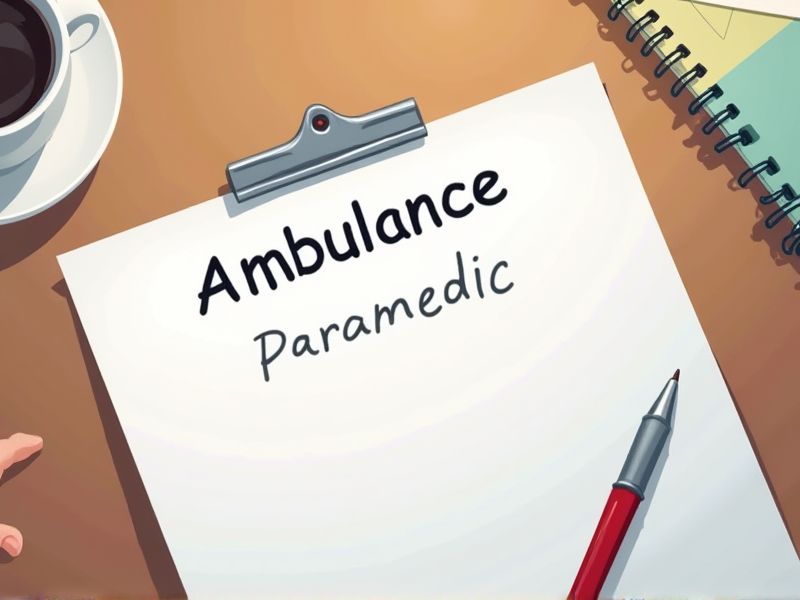
Ambulance paramedics operate in high-stakes environments where swift, accurate medical decisions can be a matter of life or death. Certifications ensure that paramedics have been trained to meet the rigorous demands of emergency healthcare, including life support and patient management. These credentials validate a professional's competency and their ability to handle the diverse challenges encountered in emergency situations. Important certifications for ambulance paramedics include Basic Life Support (BLS) and Advanced Cardiac Life Support (ACLS).
National Registry of Emergency Medical Technicians (NREMT) Certification
The NREMT certification ensures that ambulance paramedics meet national standards for emergency medical care, enhancing the consistency of care provided across different states. It validates a paramedic's skills and knowledge, fostering public trust in their ability to manage emergency situations effectively. Due to its standardized testing procedures, the certification helps maintain a high level of competency among paramedics, reducing the likelihood of medical errors. In many states, obtaining this certification is a legal requirement to practice as a paramedic, ensuring compliance with health regulations.
Basic Life Support (BLS) Certification
Ambulance paramedics need Basic Life Support (BLS) Certification because it ensures they have the skills to provide immediate care during cardiac and respiratory emergencies. Receiving BLS training increases the survival rates of patients until they reach a hospital. BLS certification equips paramedics with standardized techniques like CPR and AED usage, enhancing their ability to stabilize patients effectively in critical situations. Many healthcare regulations mandate BLS certification as a prerequisite to ensure paramedics are prepared for high-pressure scenarios.
Advanced Cardiac Life Support (ACLS) Certification
ACLS certification equips ambulance paramedics with critical skills to manage cardiac emergencies, improving patient survival rates. Certification ensures paramedics are proficient in using advanced medical tools and techniques, crucial in high-pressure situations. Proper ACLS training reduces response time and aligns paramedics with current best practices in emergency cardiovascular care. Regulatory standards often require ambulance paramedics to be ACLS-certified to maintain licensing and operational readiness.
Pediatric Advanced Life Support (PALS) Certification
Pediatric Advanced Life Support (PALS) Certification equips ambulance paramedics with the skills to effectively manage critically ill children, which can significantly enhance patient survival rates. The certification ensures paramedics are proficient in recognizing pediatric emergencies, such as respiratory failure and shock, enabling timely and appropriate interventions. PALS training incorporates the latest evidence-based practices, fostering a standardized approach to pediatric care across emergency medical services. Ambulance paramedics with PALS Certification are better prepared for various clinical scenarios, reducing the risk of adverse outcomes in pediatric emergencies.
Prehospital Trauma Life Support (PHTLS) Certification
Prehospital Trauma Life Support (PHTLS) certification equips ambulance paramedics with advanced skills and knowledge to manage traumatic injuries effectively, which often makes a significant difference in patient survival rates. Evidence shows that paramedics trained in PHTLS protocols can rapidly assess and prioritize treatment for trauma patients, thus reducing time to definitive care. The certification provides a standardized framework that enhances the decision-making capability of paramedics, ensuring consistent and high-quality care across emergency medical services. Data from multiple studies indicate improved outcomes for trauma patients when treated by paramedics with PHTLS certification, reinforcing its necessity in prehospital care.
Emergency Vehicle Operator Course (EVOC) Certification
The EVOC Certification improves driving skills, minimizing the risk of accidents when paramedics respond to emergencies at high speeds. It equips ambulance operators with knowledge of safety protocols, ensuring the safe transport of patients to medical facilities. Understanding vehicle dynamics and evasive maneuvers, paramedics can navigate through traffic congestion efficiently. Compliance with EVOC standards enhances legal accountability, reducing liability in case of incidents during emergency responses.
Hazardous Materials (HAZMAT) Certification
HAZMAT certification equips paramedics with knowledge to safely manage situations involving hazardous materials, reducing risk to patients and themselves. Proper handling and containment of these materials prevent their spread, thus minimizing environmental and public health impacts. Understanding the protocols for decontamination and protective gear usage ensures that paramedics can effectively treat patients exposed to toxic substances. This certification enhances an ambulance team's readiness for a broader range of emergencies, providing a crucial safety net in potential chemical or biological incidents.
CPR Certification (Adult, Pediatric, and Infant)
Obtaining CPR certification for all age groups equips ambulance paramedics with the necessary skills to provide life-saving interventions in critical situations. CPR techniques differ significantly between adults, pediatrics, and infants, impacting the effectiveness of resuscitation efforts. Certification ensures that paramedics possess up-to-date knowledge and proficiency in these variations, enhancing patient outcomes. Regulatory bodies often mandate these certifications to maintain high standards of emergency medical care.
Incident Command System (ICS) Certification
Obtaining ICS certification for ambulance paramedics ensures standardized communication during emergency operations, which enhances coordination among first responders. This certification equips paramedics with the skills to effectively integrate with other emergency personnel, reducing response times and improving patient outcomes. ICS training emphasizes resource management and accountability, critical for maintaining ordered and efficient scene management. Familiarity with the ICS framework helps paramedics adapt to large-scale incidents, ensuring a more structured and cohesive response effort.
Community Paramedicine Certification
Community paramedicine certification enhances the skill set of ambulance paramedics, enabling them to provide comprehensive care beyond emergency situations. This certification empowers paramedics to deliver preventive care and manage chronic conditions, reducing unnecessary hospital visits. When paramedics are certified, patient outcomes improve due to a more holistic approach to care. The healthcare system experiences decreased strain as paramedics take on roles that fill gaps in community health services.
Summary
When you ensure Ambulance Paramedics receive additional certifications, expect enhanced patient care quality. Certifications boost their confidence in handling diverse medical emergencies. Consequently, paramedics demonstrate improved clinical skills and decision-making. This leads to increased patient survival rates and satisfaction.
